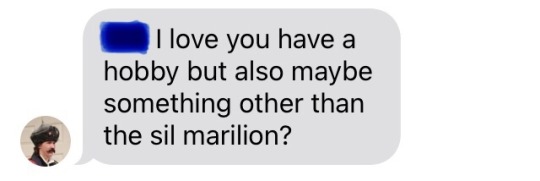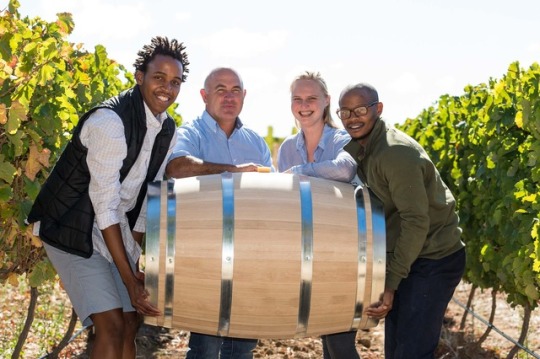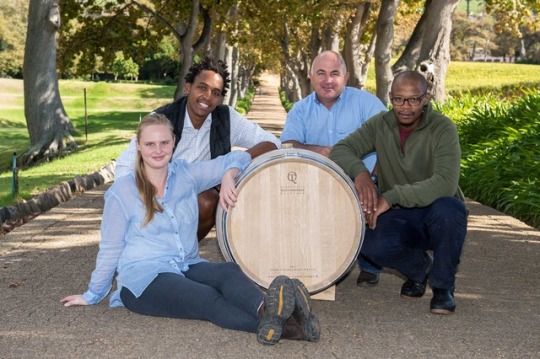#i like to dream that someday we will have an active gc with All the cousins excluding c whom we simply do not like
Text
me, mentioning in the sibling gc that my current Activity is rereading the silm to figure out what percentage of named characters die:
my little brother:

#mine#and THAT is the power of autism.#nb: parse this as ‘i love [that] you have a hobby’ not as ‘i love you …’#we are [redacteds] and we DO NOT SAY ‘i love you’ to one another. ESPECIALLY not in public view where Other People can see it#this gc actually has us three siblings and also my cousin h in it. which is fun#i like to dream that someday we will have an active gc with All the cousins excluding c whom we simply do not like#the sibling gc is named ‘[mom surname] [dad surname] clown car’ because reasons#clown car because reasons and both surnames to distinguish from Other clown cars we may be in with extended family members from either side#the extended siblings universe gc that this text is from is called ‘Young [Surname]s’ because nobody involved has any creativity#me included ig.#actually writing this made me realize that all is cousins share a surname bc our shared grandparents had 3 sons but like#it’s Possible to have cousins you Don’t share a surname with. man wtf is That like. wack#hope anyone who read these tags enjoyed this nice stroll thru Me Thinking And Learning About How Relatives Work
0 notes
Text
I spoke with my General Contractor some days ago...
An he pointed some interesting things i should know before i start fulfilling my dreams.
For context, in my city there's a representative street, unfortunately, it not looks like one by some time now. I assume maybe even 1/4 in dwellings are not residented, not occupied, and with commercial premises it it a roulette: half of them are ethereal and the other half lives for 2 yrs maybe and then change. I heard even that a few of them are not raise enough money to exist despite the popularity, and the owners could fund them because of other long-term activity other gastronomic establishments in the sector in our cities!
Anyway, back on the track. I dream of managing one (very particular) of the tenements. The tenement itself is kinda basic, with 4 levels of dwelling, each level with 3 (two in max 80 meters square, and one smaller). Two locals in base level, one about 140~ and the second by 60 msq. As far as I know, nobody lives in it, and, for the last 15 yrs, no one rented the premises. I am not sure of the purpose yet. Cheap flats to rent for students are good one of the options, along with restaurant/coffee shop and small boutique. That's kinda basic for me. Or half flats and half small offices could also work. I thought also about a workshop, or even an 3D printing workshop on one of the flats or even on the whole level.
You may think, hey, how it could be possible? are you a banana kid, or maybe some entrepreneur? It is that dream, to just own a real estate? Well, last one kinda, but I know the plan! During studies, they said to us: that in work with real estate, there are needed 3 things: the money, the good plan to use/manage/fund/whatever (not the idea but full paper-ology), and the actual real estate (anything from piece of land to dwelling itself). Two of the three, and you're good to go. You wanna flip? you need money and a plan. You wanna build, idk, an airport, a mall, or an office? you need money and land. But... what happens when you don't have money? Plan and land should be sufficient. But who the hell in these times from regular ppl have plain land with no plan?! And there comes all in white UE and the business loans. To put it simply, I can prepare all by myself proper plan (yeah; it costs a few thousand) and the bank/UE can count it as my own contribution. Enough about the funds.
My General Contractor pointed, out that it is possibility about the reason why the whole building stands unrented so long. Maybe there's a long-missed owner or inheritor? Even if the tenement is for sale in one of the estate agencies. Maybe it has some "stinky" papers, and some conservationist keeps away the potential buyers? Or the condition of the building is much worse than the other buildings? Or maybe someone died there and it is way toooooo stinky? I cannot check it just from a stranger's position. But my GC suggested something: to act like a pollster and ask ppl around, ppl living in nearby tenements, etc. The best theme is "Do ya want some refurbishment or renovations? it is loud, we're collecting signs to cancel it! No one likes noises like that. Oh, you live next to it? Do you know what was here? We are an outsourced group, we do not know anything about it, would you like to describe it?" and so on.
About the cash, little add-ons: the cost in the agencies is about 8 million PLN itself. My GC said that the old building could need real-general renovation not just small updates. The walls itself probably should be stripped away to the clear brick. Then replacement of the pipes (water, CO, electricity, possibly gas) will be easier and done already. He estimated the cost at 2 million... so it should be close to 10 mln, fantastic~.
now, all I need to do is my regular, actual work... and maybe someday finish business plan
1 note
·
View note
Photo

Cape Winemakers Guild Protégés put their first wines in barrel
Harnessing their diverse personalities and unique interests, three Cape Winemakers Guild Protégés are putting heart and soul into crafting their very first wines – now safely in barrel after the 2017 harvest.
The Protégés who have been given the opportunity to bring their creativity to life by making their own wines are Banele Vakele of Khayelitsha, Sydney Mello of Mahwelereng in Limpopo and Maryna Huysamen of Vredendal. Crafting their own wines is an essential part of the second year of the Guild’s Protégé Programme and has been made possible by the continued sponsorship of French oak barrels by the Cape Cooperage Group for the past 7 years.
Over and above the generous barrel donation, the Paarl based Cape Cooperage Group assists the Protégés by guiding them through their choice of barrel and helping them achieve the particular style of wine they aspire to make. Other annual sponsors supporting the initiative are Consol Glass and Amorim Cork who donate the bottles and the corks for the protégé wines.
“It’s an honour to support the industry in this way. We have the opportunity to partner alongside each new class of Protégés, who are actively learning, cultivating their vision, and expressing their passion for winemaking, whilst showcasing the unique terroir of South Africa,” says André Kotze, Managing Director of Cape Cooperage Group.
Besides producing their own wines, the Protégés learn how to prepare budgets, production plans and marketing proposals. This gives them valuable experience and insight into the entire winemaking process, from the creative aspects to the business end of the industry.
With the guidance of Boela Gerber at Groot Constantia, Banele Vakele is making a Shiraz based blend. For him, crafting a fine red blend is a combination of skill and art – something he intends mastering early in his winemaking career. Banele received a scholarship to attend the Cape Academy of Mathematics, Science and Technology (CAMST) in Constantia. It was on the school ground overlooking the vineyards that Banele decided to pursue a career in the wine industry.
“My mentor plays a huge role in every decision I make regarding my wine, since he understands the soil and climate of the region so well. Whenever I want to experiment with something new, I seek his advice, and he has given me the freedom to express my creative side,” Banele explains.
Sydney Mello is trying his hand at a Blanc de Blancs and chose Johan Malan at Simonsig as his mentor this year, to learn all there is to know from the pioneers of Méthode Cap Classique. While growing up in Mahwelereng, Sydney’s curiosity about the intricacies of winemaking motivated him to make the journey to the Cape Winelands.
“I find the whole process of making a bottle fermented sparkling wine (Cap Classique) very intriguing. I am fortunate that my mentor encourages a spirit of experimentation and doesn’t shy away from coming up with interesting suggestions that can further help make my wine something special,” says Sydney, who dreams of having his own label someday.
Maryna Huysamen, who is based at De Grendel under the fatherly eye of Charles Hopkins, has chosen to make a Sémillon for its rich citrus characteristics and great ageing potential for a white wine.
“The opportunity to create my own wine is exhilarating, especially alongside a great winemaker like Charles Hopkins. I am very excited to see this wine evolve and become what I intended it to be,” says Maryna, who always knew she wanted to work with nature. When she decided to become a winemaker, she was not completely sure of her choice, but after working in the cellar as part of her training, she knew that she was on the right career path.
Special presentation packs of these three Protégé wines will be auctioned in 2018 at Gala Dinners in Johannesburg and Cape Town and at the Silent Auction that takes place during the annual Nedbank Cape Winemakers Guild Auction. The funds raised at these events are ploughed back into the Protégé Programme to support the development of future winemakers and viticulturists.
“At Nedbank, applying our financial expertise to do good takes on many different shapes and forms,” explains Becky Penumlungu, Sponsorship Manager of Lifestyle Properties at Nedbank. “And as such, our partnership with the Cape Winemakers Guild Protégé Programme is testament to our commitment to identifying opportunities and supporting our country’s future industry leaders.”
Established in 2006 under the auspices of the Nedbank Cape Winemakers Guild Development Trust, the CWG Protégé Programme gives aspirant winemakers and viticulturists the rare opportunity of working side by side with members of the Guild. By cultivating, nurturing and empowering promising individuals to become winemakers and viticulturists of excellence, the Protégé Programme plays an active role in the long term health and sustainability of the industry.
For more information on the Guild, contact Tel: 021 852 0408 or send an email to [email protected]. Students interested in applying for the Protégé Programme can visit the Guild’s website at www.capewinemakersguild.com.
_______________________________________________________________________
Issued by: GC Communications
On behalf of: Cape Winemakers Guild
0 notes
Photo

Cape Winemakers Guild Protégés put their first wines in barrel
Harnessing their diverse personalities and unique interests, three Cape Winemakers Guild Protégés are putting heart and soul into crafting their very first wines – now safely in barrel after the 2017 harvest.
The Protégés who have been given the opportunity to bring their creativity to life by making their own wines are Banele Vakele of Khayelitsha, Sydney Mello of Mahwelereng in Limpopo and Maryna Huysamen of Vredendal. Crafting their own wines is an essential part of the second year of the Guild’s Protégé Programme and has been made possible by the continued sponsorship of French oak barrels by the Cape Cooperage Group for the past 7 years.
Over and above the generous barrel donation, the Paarl based Cape Cooperage Group assists the Protégés by guiding them through their choice of barrel and helping them achieve the particular style of wine they aspire to make. Other annual sponsors supporting the initiative are Consol Glass and Amorim Cork who donate the bottles and the corks for the protégé wines.
“It’s an honour to support the industry in this way. We have the opportunity to partner alongside each new class of Protégés, who are actively learning, cultivating their vision, and expressing their passion for winemaking, whilst showcasing the unique terroir of South Africa,” says André Kotze, Managing Director of Cape Cooperage Group.
Besides producing their own wines, the Protégés learn how to prepare budgets, production plans and marketing proposals. This gives them valuable experience and insight into the entire winemaking process, from the creative aspects to the business end of the industry.
With the guidance of Boela Gerber at Groot Constantia, Banele Vakele is making a Shiraz based blend. For him, crafting a fine red blend is a combination of skill and art – something he intends mastering early in his winemaking career. Banele received a scholarship to attend the Cape Academy of Mathematics, Science and Technology (CAMST) in Constantia. It was on the school ground overlooking the vineyards that Banele decided to pursue a career in the wine industry.
“My mentor plays a huge role in every decision I make regarding my wine, since he understands the soil and climate of the region so well. Whenever I want to experiment with something new, I seek his advice, and he has given me the freedom to express my creative side,” Banele explains.
Sydney Mello is trying his hand at a Blanc de Blancs and chose Johan Malan at Simonsig as his mentor this year, to learn all there is to know from the pioneers of Méthode Cap Classique. While growing up in Mahwelereng, Sydney’s curiosity about the intricacies of winemaking motivated him to make the journey to the Cape Winelands.
“I find the whole process of making a bottle fermented sparkling wine (Cap Classique) very intriguing. I am fortunate that my mentor encourages a spirit of experimentation and doesn’t shy away from coming up with interesting suggestions that can further help make my wine something special,” says Sydney, who dreams of having his own label someday.
Maryna Huysamen, who is based at De Grendel under the fatherly eye of Charles Hopkins, has chosen to make a Sémillon for its rich citrus characteristics and great ageing potential for a white wine.
“The opportunity to create my own wine is exhilarating, especially alongside a great winemaker like Charles Hopkins. I am very excited to see this wine evolve and become what I intended it to be,” says Maryna, who always knew she wanted to work with nature. When she decided to become a winemaker, she was not completely sure of her choice, but after working in the cellar as part of her training, she knew that she was on the right career path.
Special presentation packs of these three Protégé wines will be auctioned in 2018 at Gala Dinners in Johannesburg and Cape Town and at the Silent Auction that takes place during the annual Nedbank Cape Winemakers Guild Auction. The funds raised at these events are ploughed back into the Protégé Programme to support the development of future winemakers and viticulturists.
“At Nedbank, applying our financial expertise to do good takes on many different shapes and forms,” explains Becky Penumlungu, Sponsorship Manager of Lifestyle Properties at Nedbank. “And as such, our partnership with the Cape Winemakers Guild Protégé Programme is testament to our commitment to identifying opportunities and supporting our country’s future industry leaders.”
Established in 2006 under the auspices of the Nedbank Cape Winemakers Guild Development Trust, the CWG Protégé Programme gives aspirant winemakers and viticulturists the rare opportunity of working side by side with members of the Guild. By cultivating, nurturing and empowering promising individuals to become winemakers and viticulturists of excellence, the Protégé Programme plays an active role in the long term health and sustainability of the industry.
For more information on the Guild, contact Tel: 021 852 0408 or send an email to [email protected]. Students interested in applying for the Protégé Programme can visit the Guild’s website at www.capewinemakersguild.com.
_______________________________________________________________________
Issued by: GC Communications
On behalf of: Cape Winemakers Guild
0 notes